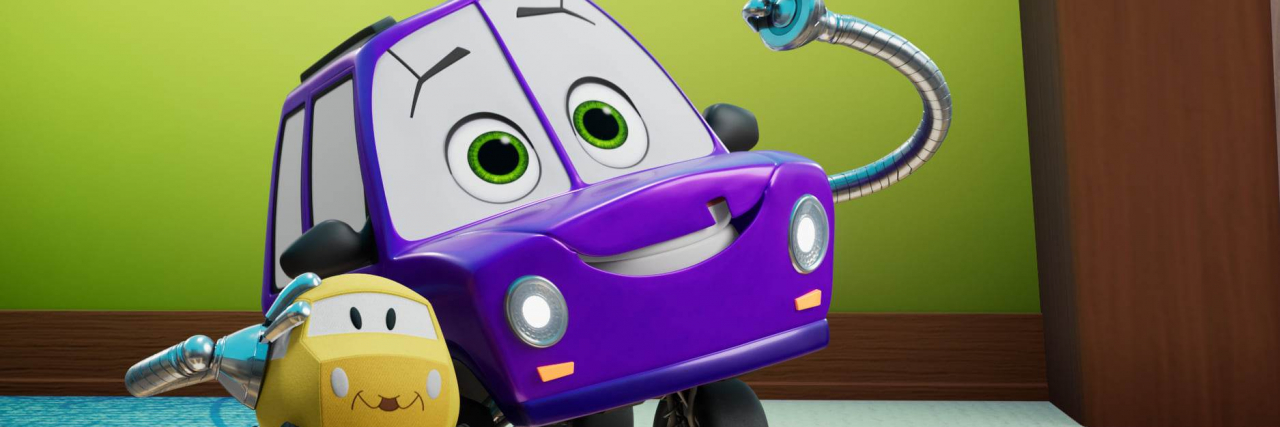“Firebuds” premiered on Disney Junior last year, featuring kids of first responders and their talking vehicle sidekicks helping them save the day and people in their community. “Firebuds” shows the importance of working together to get the job done.
Here is a sneak peek of a new episode, “Cleft Hood,” that features a character played by a young voice actor with a cleft lip and palate. You can watch the full episode on Disney Junior or stream it on Disney+.
In this episode we are introduced to Castor, who has a “cleft hood,” and is having surgery to improve it.
What is a cleft lip and/or cleft palate? Cleft lip and cleft palate are facial and oral malformations in a baby’s lip and mouth at birth. As someone with multiple disabilities, I related to Castor in some ways, because I had to have a lot of surgeries growing up to improve my way of life.
I was given the opportunity to talk to the writer of this episode, Jeremy Shipp, and ask him some questions about this important episode.
Larissa: As someone who has a disability myself, I don’t see a lot of kids with cleft lip and/or cleft palate on children’s television. What or more specifically who inspired you to create this episode?
Jeremy: This episode was inspired by my son. He was born with a cleft lip and cleft palate, and just like you point out, there aren’t a wealth of characters who look like him on screen. I wanted to change that. I wanted my son to see a character who looked like him on the show. I wanted him to see a character with facial difference who was portrayed in a joyful and positive light.
Larissa: How important was it for you to cast this role accurately and be representative of those who have cleft lips/palates? Was your son the very first casting choice? Or did you look for other children/actors that had a cleft lip and/or cleft palate?
Jeremy: It was incredibly important to me that the actor who voiced Castor have lived experience of a cleft. People with cleft palates, for example, often have to work to form certain sounds—in particular with the front of their mouth. Like the T or S sound. My son has worked very hard in speech therapy, and he sounds great, but he also has a beautiful, unique sound. And I wanted the character to have that sound. I think my son also happens to be a good actor, so I suggested him for the part.
As a writer, I’m removed from the casting process, so I don’t know how many people they listened to for the role. But I know Henry put a lot of time and effort into his audition… and he got the part! We were ecstatic.
Larissa: I loved that in the episode, surgery is brought up and all the big emotions that can come with it for kids with and without disabilities. What would be your advice to parents with kids about to have surgery that are scared and feeling big emotions about it?
Jeremy: Thank you for asking that. My advice to parents is to remember the thing that Axl learns in the episode: empathy. Think about what the world is like from their child’s point of view. In particular, for kids with cleft lips and palates: often in the first year of their lives—before they form lasting memories—they’re taken away from their parents, and they’re put under anesthesia and they’re operated on. I believe that these experiences remain in their subconscious, and may contribute to an inherent fear of doctors and hospitals and so forth. So be patient with them, give them lots of love, and explain that you’ll be right there for them no matter what.
Larissa: Will there be more episodes in the future with this character?
Jeremy: I am not at liberty to discuss future episodes, but you never know!
Larissa: What do you hope parents, and especially kids, take away from this episode?
Jeremy: Two things. First, that people with facial difference aren’t “less than.” People with facial differences can be just as fun, and enthusiastic, and friendly as anybody else.
And second—and I mentioned this above—empathy. I want kids to exercise and grow their ability to think about things from others’ points of view.
What I especially love about this episode of “Firebuds” was the representation of cleft lip and cleft palate, because we don’t see nearly enough of it on television. I also loved that surgery was included, the feelings that can come up. And how important having empathy for people that have had surgeries, especially those of us with disabilities and cleft lip or cleft palate, this was so refreshing. I hope it makes kids feel seen and shows kids that have to go through things like surgery that they’re not alone. And for other kids that don’t have to experience this, if they know someone who does, they can show empathy and compassion for their friends. Because we need to see more like it on television.
Image via Disney Junior

